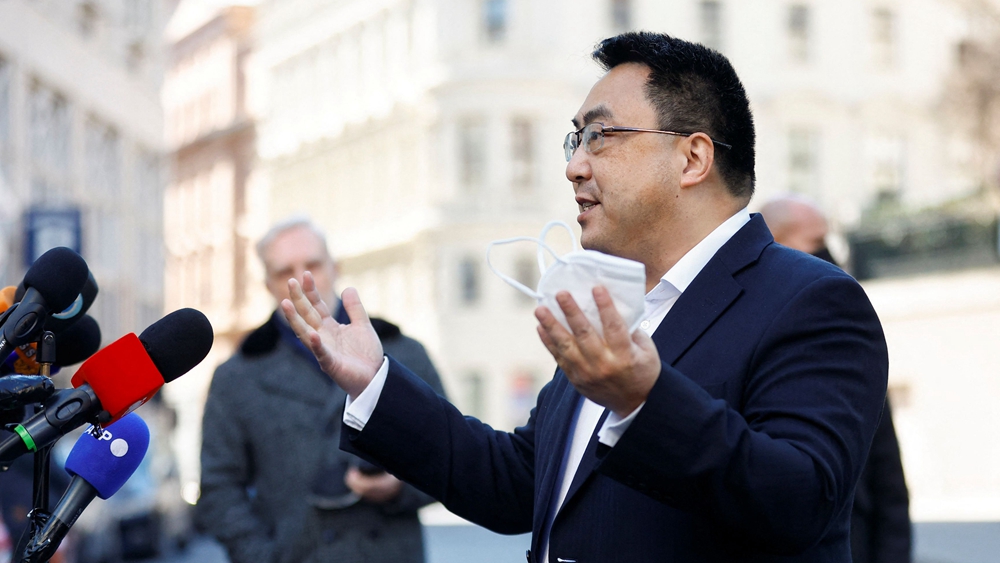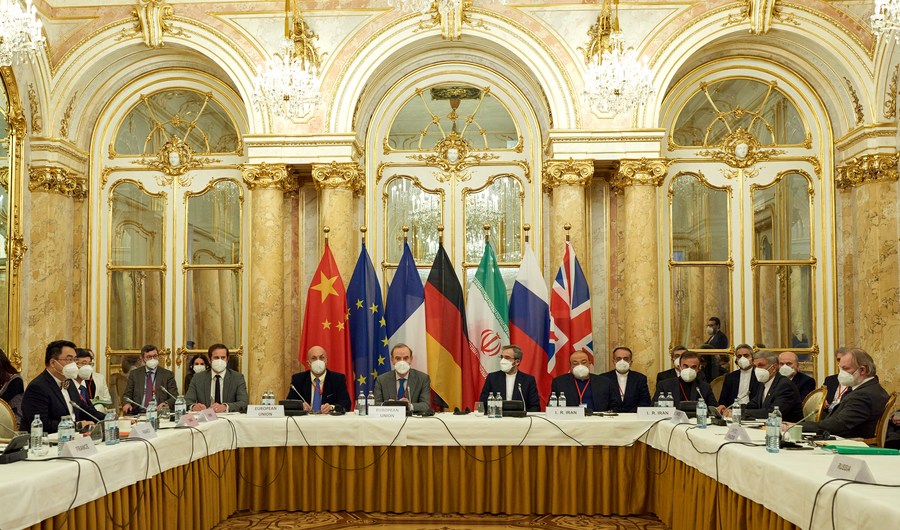
China's Permanent Representative to the United Nations in Vienna Wang Qun speaks in front of Palais Coburg, venue for the Iran nuclear talks, in Vienna, Austria, March 11, 2022. /Reuters
China's Permanent Representative to the United Nations in Vienna Wang Qun speaks in front of Palais Coburg, venue for the Iran nuclear talks, in Vienna, Austria, March 11, 2022. /Reuters
The concerns and demands of all parties to the Iran nuclear talks must be addressed properly, China's Permanent Representative to the United Nations in Vienna Wang Qun said on Friday.
Wang made the remarks after the European Union announced "a pause" of the Vienna talks aiming to revive a 2015 Iran nuclear deal due to "external factors."
Wang, China's chief negotiator, said that the suspension of the Vienna talks shows that the negotiations "are not taking place in a vacuum," but are "a microcosm of political reality." He stressed that political dialogue and negotiations are the only solution.
Under the 2015 deal, formally known as the Joint Comprehensive Plan of Action (JCPOA), Iran accepted some restrictions on the development of its nuclear program in return for removal of UN and Western sanctions.
However, then U.S. President Donald Trump withdrew the country from the deal unilaterally in 2018, and reinstated old and new sanctions against Iran. Tehran retaliated by dropping some of its nuclear commitments.
Since April 2021, eight rounds of negotiations have been held between Iran and the remaining parties to the JCPOA, with the United States indirectly involved, aimed at removal of sanctions against Iran and the restoration of the pact.

A meeting of the JCPOA Joint Commission is held in Vienna, Austria, November 29, 2021. /Xinhua
A meeting of the JCPOA Joint Commission is held in Vienna, Austria, November 29, 2021. /Xinhua
Parties involved in the Vienna talks said earlier that the negotiations had reached the final stage with a draft deal ready, but remaining differences between Tehran and Washington and the Ukraine crisis have complicated the talks.
Iran's top security official, Ali Shamkhani, said on Thursday that the U.S. did not have the will to reach an agreement and was insisting on "unacceptable proposals."
Shamkhani tweeted that in the absence of a political decision by the U.S. the talks "become more complicated every hour."
Russian Foreign Minister Sergei Lavrov on March 5 demanded guarantees that Russian trade with Iran would not be affected by sanctions imposed on Moscow over Ukraine – a demand Western powers say is unacceptable and Washington has insisted it will not agree to.
"A pause in #ViennaTalks is needed, due to external factors," EU foreign policy chief Josep Borrell wrote on Twitter on Friday. "A final text is essentially ready and on the table."
Mikhail Ulyanov, Russia's envoy to the talks, said on Friday that the conclusion of the negotiations was not solely dependent on Moscow.
"The conclusion of the deal does not depend on Russia only," Ulyanov told reporters after meeting EU coordinator Enrique Mora. "There are others actors who need additional time and who have additional concerns and they are being discussed."
Wang said parties to the Vienna talks have not reached a full agreement on the text of a deal. China calls on all parties to intensify diplomatic efforts during the recess and clear all obstacles through dialogue and negotiations to reach a deal, he added.
He stressed that China has played a "vital and constructive" role throughout the talks. China will continue to promote an early agreement from the perspectives of upholding the JCPOA and safeguarding the global non-proliferation regime and peace in the Middle East, he added.

